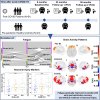Dolphin
Senior Member (Voting Rights)
Free full text:
Kathrin Reetz, MD, PhD, Julia Walders, MD, PhD
Brain Communications, fcaf366, https://doi.org/10.1093/braincomms/fcaf366
Published:
23 September 2025
Article history
We conducted a monocentric, longitudinal study using resting-state functional and structural T1-weighted magnetic resonance imaging data from 51 patients with Post-COVID-19 Condition (mean age 50 years, 33 female) collected at a mean time of 6, 23 and 38 months after COVID-19 infection. The trajectory of brain changes was compared to 23 age- and sex-matched healthy controls (mean age 37 years, 13 female) with similar time intervals between brain scans and analysed in relation to clinical, neuropsychological and fluid biomarkers including interleukins and neurodestruction markers at all timepoints. In addition, hand grip strength to evaluate muscular fatigue, was assessed at the final follow-up visit.
Self-reported fatigue improved over time but was still moderate on average three years after COVID-19 infection, while measures of hand grip strength and cognitive performance were largely unaffected. We found a significant increase of both lateral ventricles (∼8%) and the third (∼6%) ventricle accompanied by a structural volume reduction in adjacent areas including the thalamus, pallidum, caudate nucleus and putamen. An increased neuronal activation pattern was widespread and pronounced in these areas. The brainstem no longer exhibited volume loss as reported in our pervious study, but enhanced functional connectivity. Laboratory markers including interleukins and neuronal injury markers remained within the normal reference ranges across all study timepoints.
Our study revealed an overall slow but evident clinical improvement, including improved fatigue, regular muscular strength and recovery as well as normal cognitive function without signs of systemic inflammation three years after COVID-19. Clinical improvement is reflected by a pattern of brain recovery along periventricular regions. This pattern is characterized by structural stabilization and increased connectivity starting in the brainstem as well as efficient neuronal recruitment and increased activation in the basal ganglia, with no evidence of neuronal injury. These results highlight the positive long-term recovery trajectory in post-COVID patients.
Evidence of clinical and brain recovery in post-COVID-19 condition: a three-year follow-up study
Ravi Dadsena, PhD, Sophie Wetz, Anna Hofmann, MD, PhD, Ana Sofia Costa, PhD, Sandro Romanzetti, PhD, Stella Andrea Lischewski, MD, PhD, Christina Krockauer, MD, PhD, Carolin Balloff, PhD, Ferdinand Binkofski, MD, PhD, Jörg B Schulz, MD, PhD,Kathrin Reetz, MD, PhD, Julia Walders, MD, PhD
Brain Communications, fcaf366, https://doi.org/10.1093/braincomms/fcaf366
Published:
23 September 2025
Article history
Abstract
Fatigue and cognitive dysfunction linked to persistent brain changes have been reported for up to two years after COVID-19. In this study, we followed the clinical, neuroimaging and fluid biomarker trajectories over three years post SARS-CoV-2 infection to evaluate potential signs and underlying factors of brain recovery.We conducted a monocentric, longitudinal study using resting-state functional and structural T1-weighted magnetic resonance imaging data from 51 patients with Post-COVID-19 Condition (mean age 50 years, 33 female) collected at a mean time of 6, 23 and 38 months after COVID-19 infection. The trajectory of brain changes was compared to 23 age- and sex-matched healthy controls (mean age 37 years, 13 female) with similar time intervals between brain scans and analysed in relation to clinical, neuropsychological and fluid biomarkers including interleukins and neurodestruction markers at all timepoints. In addition, hand grip strength to evaluate muscular fatigue, was assessed at the final follow-up visit.
Self-reported fatigue improved over time but was still moderate on average three years after COVID-19 infection, while measures of hand grip strength and cognitive performance were largely unaffected. We found a significant increase of both lateral ventricles (∼8%) and the third (∼6%) ventricle accompanied by a structural volume reduction in adjacent areas including the thalamus, pallidum, caudate nucleus and putamen. An increased neuronal activation pattern was widespread and pronounced in these areas. The brainstem no longer exhibited volume loss as reported in our pervious study, but enhanced functional connectivity. Laboratory markers including interleukins and neuronal injury markers remained within the normal reference ranges across all study timepoints.
Our study revealed an overall slow but evident clinical improvement, including improved fatigue, regular muscular strength and recovery as well as normal cognitive function without signs of systemic inflammation three years after COVID-19. Clinical improvement is reflected by a pattern of brain recovery along periventricular regions. This pattern is characterized by structural stabilization and increased connectivity starting in the brainstem as well as efficient neuronal recruitment and increased activation in the basal ganglia, with no evidence of neuronal injury. These results highlight the positive long-term recovery trajectory in post-COVID patients.

